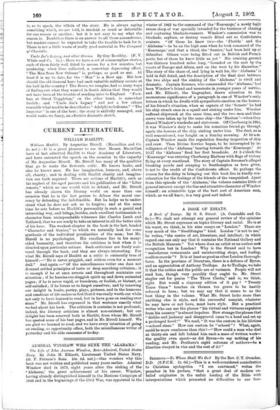CURRENT LITERATURE.
WILLIAM HAZLITT.
William Hazlitt. By Augustine Birrell. (Macmillan and Co. 2s. net.)—It is a great pleasure to see that Messrs. Macmillan
have at last admitted Hazlitt to their Academy of Literature, and have entrusted the speech on the occasion to the capacity of Mr. Augustine Birrell. Mr. Birrell has many of the qualities that go to make the first-rate critic. He knows books, and also he knows men. He has imagination, humour, and; above all, charity ; and in dealing with Hazlitt charity and imagina- tion are both required. There are actions of Hazlitt's, such as his neglect of his aged parents and his publication of the "Liber Amoris," which no one would wish to defend; and Mr. Birrell has already shown the literary world on more than one occasion that he is the last person to debase the moral cur- rency by defending the indefensible. But he helps us to under- stand what he does not ask us to forgive; and at the same time he sets before us Hazlitt's personality in such a genial and interesting way, and brings, besides, such excellent testimonials to character from unimpeachable witnesses like Charles Lamb and Talfourd, that we are ready to take an interest in all the better side of his hero. The weakest chapter in the book is the last, headed "Character and Genius," to which we naturally look for some synthesis of the individual peculiarities of the man; but Mr. Birrell is no psychologist. His excellence lies in his many- sided humanity, and therefore his criticism is best when it is directed upon particular actions. Such criticisms are freely scat- tered through the book, and they are always interesting. For what Mr. Birrell says of Hazlitt as a critic is eminently true of himself :—" He is never priggish, and seldom even for a moment dull." And again :—" Of the miscellaneous writer one does not demand settled principles of taste or deep searching criticism; it is enough if he at once arrests and throughout maintains our attention ; if he hurries our sluggish spirit up and down animated pages; if he is never vapid, or humdrum, or foolish, or blatant, or self-satisfied; if he forces us to forget ourselves; and by renewing our delight in books, poetry, plays, pictures, and in the humours and emotions of life makes us feel that it was really worth our while not only to have learned to read, but to have gone on reading ever since." Mr. Birrell has expressed in that sentence exactly what we feel about his book. The criticism it contains is not profound; indeed, the literary criticism is almost non-existent; but our delight has been renewed both in Hazlitt, from whom Mr. Birrell has quoted some of his best pages, and in Mr. Birrell himself. We are glad we learned to read, and we have every intention of going on reading, as opportunity offers, both the miscellaneous writer of yesterday and his able successor of to-day.






































 Previous page
Previous page